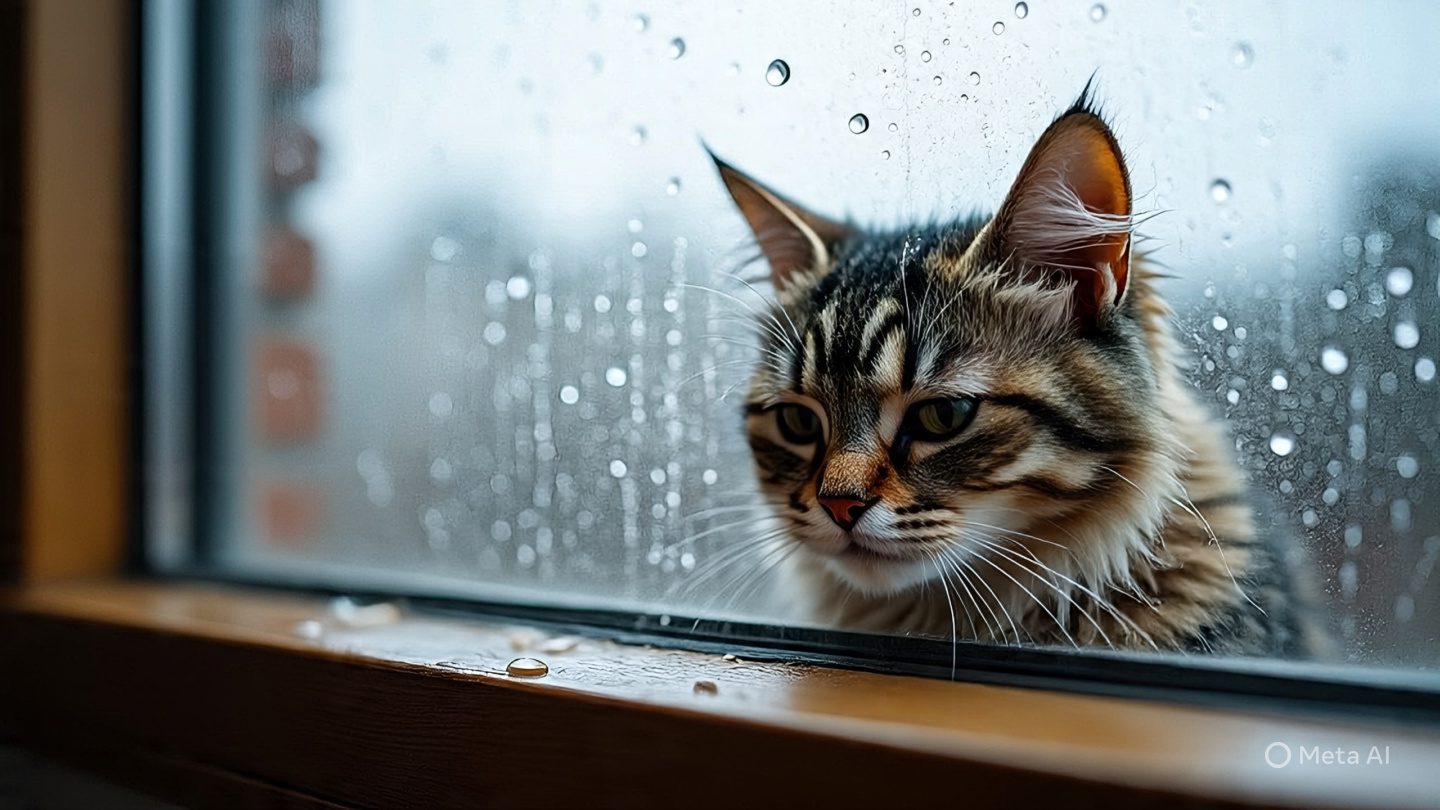Have you ever noticed that your cat acts differently when the weather changes? One minute she's lying in a sunbeam like she owns the place, and the next she's hiding under the bed like there's a monster there.
It turns out that the weather can have a big effect on our cats, not just how they feel but also how healthy they are. Let's go into this interesting subject and explore how the weather affects our kitties in different ways.
Top Takeaways and Key Concepts
- Keep cats hydrated and provide shady, cool spaces during hot weather.
- Provide warm, insulated shelters and heated bedding during cold seasons.
- Offer interactive toys, climbing structures, and obstacle courses to prevent boredom.
- Monitor cats for seasonal allergies and consult a vet if symptoms appear.
- Adjust indoor environments seasonally with air flow, sunlight, and safe enrichment.
Article Summary
Weather significantly affects cats’ health, behavior, and comfort across seasons. During hot weather, cats need hydration, shade, and cooling options to avoid heat stress, while cold weather requires insulated shelters, warmth, and regular activity to maintain health. Wet or rainy days can cause boredom and irritability, making indoor enrichment, climbing structures, and interactive toys essential. Seasonal changes can also trigger allergies, so owners must monitor symptoms, maintain clean environments, and seek veterinary care. By observing weather-related changes and adjusting their cats’ environment, pet owners can improve their cats’ physical and emotional well-being year-round.
Video Summary
Please Note: This post may contain affiliate links. If you click one of them, we may receive a commission at no extra cost to you. As an Amazon Associate, I earn from qualifying purchases.
Jump to Content
The Heat Is On: Summer Problems
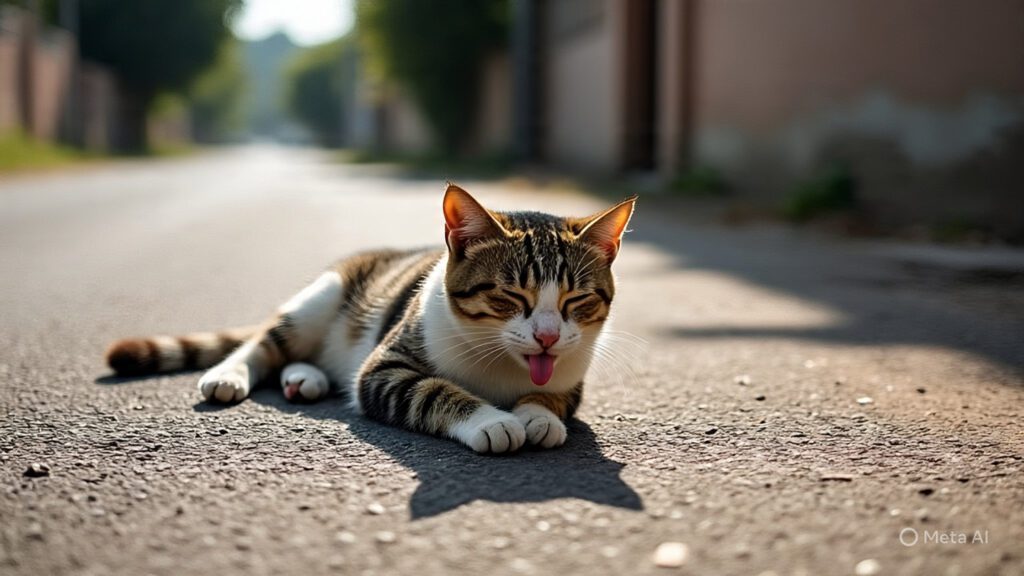
Summer is great for us humans because we can go to the beach and have barbecues, but for our furry friends, it can be very hard.
Most of the time, cats are good at keeping their body temperature stable. But if they're locked in a house without air conditioning during a heat wave, they can't do that. Can you picture yourself trying to cool off while wearing a fur coat? I don't think so!
When it becomes really hot, cats can get heat exhaustion or even heat stroke. If your cat is panting too much, drooling, or seeming tired, these are signs that they need to get out of the heat right away. What can you do, then?
It's important to make sure your cat has access to lots of fresh water and shady spaces to relax, especially in the summer when it's hot. Cats can get too hot very easily, so giving them a cool area to go can help them cool down. You might also want to think about getting your cat a cooling pad. These mats are made to help people cool off by moving heat away from their body. Come on, who wouldn't want to relax on something that feels good? It's like a little trip to the beach!
It's also crucial to make sure they drink enough water. Cats don't always drink enough water, so putting out several bowls of water throughout the house or installing a pet water fountain will help them keep hydrated. Not only does fresh, pure water assist keep you from getting dehydrated, it also aids your kidneys and your overall health.
It's interesting to note that certain cats may get more aggressive or irritable when it's hot outside. When you think about it, this behavior makes sense: just like us, cats can act out in anger when they're too hot. If Mr. Whiskers suddenly starts acting like your leg is his sworn enemy or shows other signs of being upset, it could mean that he's too hot and stressed.
In these situations, making the space more comfortable is really important. Air conditioning can assist; keeping the temperature inside colder not only makes your pet feel better, but it also helps them stay quiet. If you don't have air conditioning, fans placed near their favorite places to relax can assist move air about and make the room more comfortable.
Also, giving them other ways to cool off, such wet towels to lounge on or ice packs wrapped in fabric, can make them more comfortable on really hot days. Brushing your cat regularly is another useful tip. It gets rid of extra fur and lets more air circulate over their skin.
In the end, paying attention to your cat's comfort throughout the summer will make their life much better. By making sure they have access to fresh water, shady places to hide, and cool places to rest, and by knowing how heat affects their mood, you'll help them be a happier and healthier pet who can enjoy all the seasons without any trouble! So go ahead and make those changes; Mr. Whiskers will be grateful for the work!
Handy Amazon Shopping Directory for Cat Supplies
Cat Food - Cat Toys - Cat Health - Grooming - Carriers - Cat Beds - Apparel
Furniture - Cat Doors - Collars - Feeding/Watering - Flea/Tick Control - Treats
Winter Woes: Worries About the Cold
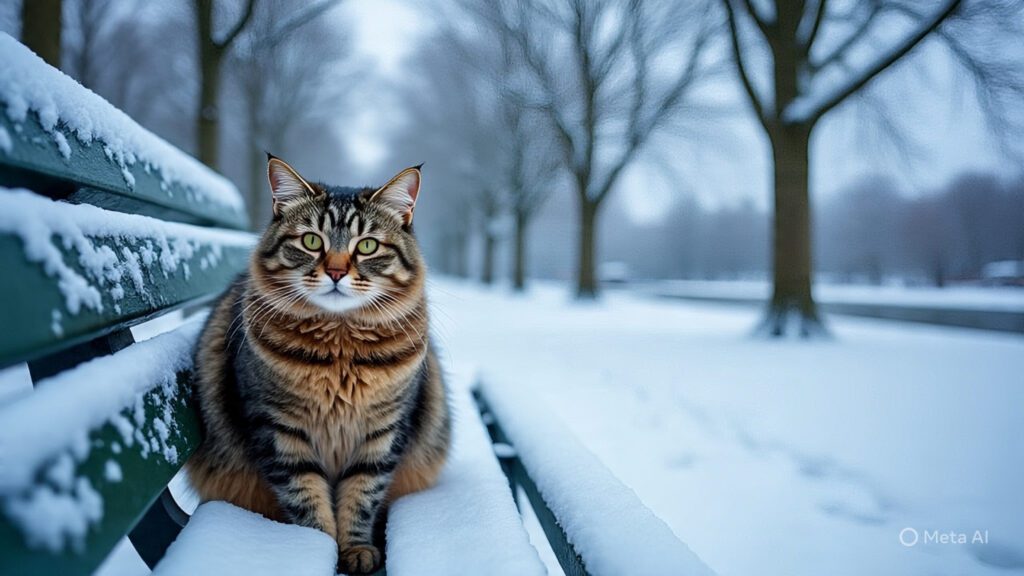
But winter is hard for our cats in its own way. A lot of cats like to wrap up on warm blankets by the fire, but very cold weather may be very dangerous too!
We don't just read about hypothermia in survival novels; it may also happen to cats who are left outside for too long in really cold weather.
If you live in a place where it snows a lot, keep a watch on any outdoor cats (if there are any).
It's really important to make sure your cats have enough shelter, especially in the winter when biting winds and freezing temperatures may be very bad for their health. Giving them a warm, safe place to escape the bad weather doesn't take much work, but it may make a big difference in their health and comfort. A small insulated cat house or simply a soft blanket-covered corner of your home can be the perfect place for cats to hide. We should keep these small animals safe and comfortable since they provide us so much delight.
Also, and this is a very crucial issue, cold weather can make indoor cats act in quite different ways. You could notice that your cat is less active than usual when the days get shorter and the weather gets colder. The cold air can make kids less excited about playing, which means they are less likely to do their favorite things. This change can be worrying because less exercise can lead to weight gain or other health problems over time.
As good pet owners, we must make sure our pets stay active even when it's cold outside. One good method to achieve this is to give them interactive toys that get their minds and bodies moving. Toys that look like prey or puzzle feeders help keep your cat's natural hunting instincts sharp and give them something to think about. Playing with a crumpled piece of paper or a string toy can help get them excited and make them want to move around and keep active.
You can also make an ordinary day an adventure for your cat by making tiny obstacle courses out of cushions or boxes around your house. You might even play games where you hide treats throughout the home for them to uncover. This gets them moving and uses their innate curiosity.
Keeping a regular schedule throughout the colder months is also good. Playing with your cat at the same time every day helps them get used to a routine and gives them something to look forward to, even if they spend most of their time cuddled up in their favorite blanket.
Also, don't forget to add warmth to their surroundings in ways other than just providing shelter. Heating pads made just for pets (with safety considerations) can make them more comfortable on really cold nights. Soft bedding near windows (but not in direct drafts) lets them soak up whatever sunlight that comes through on winter days while being warm.
In conclusion, even though cold weather may change how our furry friends act, there are many things we can do as pet owners to keep them active and interested all season long. We help their physical health and happiness throughout the cold months by giving them enough shelter, encouraging them to play through different fun activities, and keeping our homes warm.
Rainy Days: How Wet Weather Affects
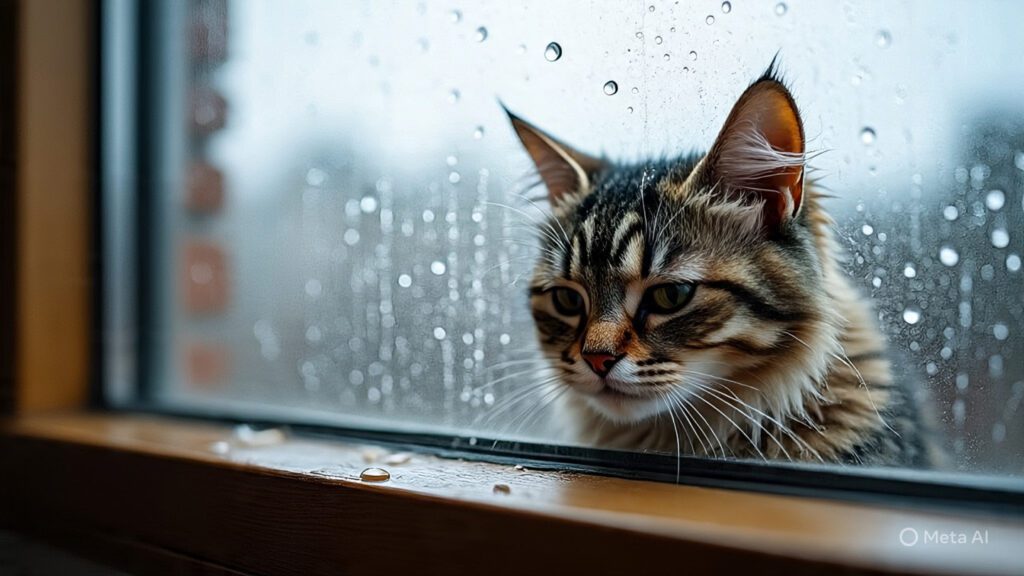
Let's talk about the good old British weather now. There's nothing more peaceful than looking out the window with your cat next to you and waiting for the rain to cease. So, drops of rain are streaming down the window.
It's interesting that wet days can influence a cat's temperament, too. I find that quite interesting.
Now, cats might get a little more emotional—understatement—when they're in water, so heavy rain doesn't let or encourage them to go outside.
Some cats are bored, irritated, and restless when they have to stay inside because of bad weather.
It's easy to see why having a bored cat at home makes it more likely that someone will break anything. Have you ever had the heartbreaking experience of having your favorite pair of shoes—the cute ones you love so much—get completely ruined beyond repair? Yes, that was probably a “shoe attack,” and let's be honest: boredom had a big part in this act of destruction. Cats are naturally curious and playful animals. When they don't have much to do, cats often get into trouble to keep themselves busy.
To keep your cat from getting bored and breaking your things, think about adding fun activities and places to your home. Climbing trees or cat towers can keep them busy for hours while also letting them satisfy their natural desire to climb and explore. These constructions not only let them see their surroundings from new heights, but they also give them a safe place to work out and stretch their muscles.
Puzzle feeders stocked with treats are another great way to keep your cat's mind active. These interactive toys let them think critically as they try to find concealed treats, making mealtime more fun than just another scheduled feeding. This kind of mental activity is very important for their health and happiness, especially when they can't play outside because of bad weather.
I think it can be hard to keep our cats happy when the weather isn't great outside. But by making our houses more interesting places to be, we can turn them into playgrounds that keep children busy and active all year long. Think about putting different enrichment stations around your house. For example, you might provide nice corners with blankets for them to relax in, put scratching posts in different places, or even change out their toys on a regular basis so they always have something new to find.
Also, playing with wand toys like laser pointers can be a terrific way for you and your cat to bond while also letting them get some exercise in a fun way. You might also set up tiny obstacle courses with things you have around the house, such chairs and boxes. This will get your kids moving and make playtime feel like an adventure!
Along with these suggestions, giving cats places to perch on windowsills lets them watch birds or squirrels outdoors. This is a natural way to keep them entertained and get them excited about hunting without having to go outside in bad weather.
In the end, making your home a more interesting place for your cat to live will not only stop them from being bad, but it will also make their life better. As pet parents, we can make sure our furry friends stay happy and busy, even when the sun is behind the clouds, by being creative and putting in some effort. Let's take on the challenge of keeping our cats happy. After all, a happy cat makes everyone in the house happier!
Changes in the Seasons: Allergies and Other Things
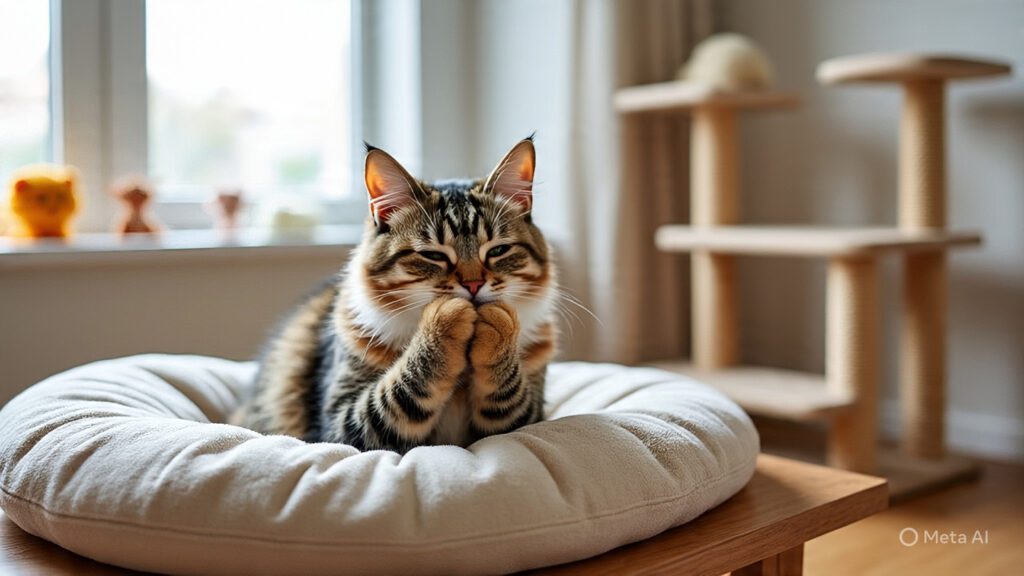
As time goes on and we look ahead to weather and climate predictions, there may come a day when flowers bloom brightly in the spring, filling the air with color and scent. But for a lot of cats, this wonderful time of year can also mean the start of pollen allergies, which are similar to hay fever in us. Yes, this is a serious problem that pet owners should be aware of.
When cats come into contact with pollen, they can have different allergic reactions, which can cause symptoms including sneezing, itchy skin, watery eyes, and even trouble breathing. During peak allergy seasons, these problems can greatly lower their quality of life. So, cat owners need to be on the lookout for these indicators and act quickly. If you see your cat acting strangely or showing signs of allergies, you should take them to the clinic right away. A vet can give you an accurate diagnosis and suggest the best therapies or ways to manage your cat's condition based on its individual needs.
Pet owners should not only get professional assistance, but they should also take steps to keep their cat's environment clean throughout allergy season. This could mean keeping windows shut on days when pollen levels are high, using air purifiers inside, and cleaning surfaces where allergens may collect on a regular basis. If you bathe your cat more often, it can help get rid of pollen particles that stick to their fur after they have been outside.
Also, and this is very important, everybody who has a cat knows that these animals are very picky about where they live. They do best in places where they feel safe and at ease, so it's very important to keep your home in the best possible shape. This means not just keeping allergens under control, but also making sure your cat has clean litter boxes, fresh drink, and warm places to sleep.
To help your pet's health, it's important to understand how they see the world as an animal. Cats are very sensitive and rely on their senses a lot. This means that paying attention to changes in their behavior or preferences can provide you a lot of information about how they are feeling physically and emotionally. For example, if your cat suddenly stops going to particular parts of the house or becomes less social in the spring because of allergies, you can respond appropriately if you notice these changes.
To keep your pet healthy, we as caretakers need to be careful and alert. By keeping up with possible seasonal problems like pollen allergies and working to make our homes more comfortable for our cats—through environmental controls or veterinary care—we can help make sure they have happy lives full of joy (and fewer itchy moments) all year long! So let's be responsible pet owners and speak up for the health of our furry friends while we all deal with the changing world around us!
Suggested Resources:
Understanding Feline Allergies
https://www.aspca.org/pet-care/cat-care/common-cat-allergies
Keeping Your Indoor Cat Happy
https://www.humanesociety.org/resources/keeping-your-indoor-cat-happy-and-healthy
Caring For Senior Cats
https://www.cattime.com/cat-facts/senior-cats-health-care-tips
Frequently Asked Questions
How does hot weather affect cats?
High temperatures can lead to heat stress, panting, drooling, and lethargy. Cats need shade, hydration, and airflow during heat waves to avoid overheating.
What should I provide my cat during winter?
Cold seasons require warm bedding, insulated shelter, and continued indoor activity to prevent hypothermia and reduce inactivity-related weight gain.
Why do cats seem more restless on rainy days?
Rain limits outdoor exploration and can cause boredom and irritability. Indoor climbing spaces, toys, and puzzle feeders help prevent destructive behavior.
Can weather changes trigger allergies in cats?
Yes, pollen seasons can cause sneezing, itchy skin, watery eyes, and discomfort. Veterinary evaluation helps confirm allergies and guide treatment.
How can I keep my cat hydrated in hot climates?
Provide multiple fresh water sources and consider fountains or wet food to increase moisture intake during warmer weather.
Do indoor cats also react to seasonal changes?
Yes, indoor cats may still become less active in winter or overstimulated in summer, so seasonal enrichment and comfort adjustments are important.
What indoor activities help cats cope with weather limitations?
Interactive play sessions, obstacle courses, window perches, and rotating toys support mental stimulation and maintain physical activity when outdoor time is limited.

Kevin Collier is a dedicated feline enthusiast and expert contributor at CatFAQ.com, where he shares his knowledge on cat health, training, and overall well-being. With years of experience caring for and studying cats, Kevin provides insightful tips and practical advice to help cat owners nurture and understand their pets better. His passion for enhancing the human-animal bond shines through in his articles, making them a valuable resource for anyone looking to improve their cat’s quality of life. Whether it’s training techniques or health care tips, Kevin aims to empower cat owners with the information they need to ensure their furry companions thrive.

